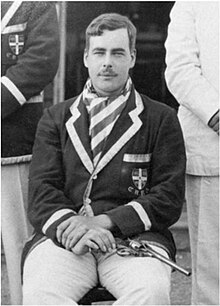Ian Heslop | |
|---|---|
 Heslop, photographed in 1926 as part of a Cambridge University shooting team in the colours of the Cambridge University Rifle Association | |
| Born | Ian Robert Penicuick Heslop June 1904 |
| Died | 2 June 1970 (aged 65) |
| Nationality | British |
| Other names | "The Purple Emperor" (nickname) |
| Education | |
| Occupations |
|
| Known for | Conservation and collecting, especially of butterflies and the pygmy hippopotamus |
| Notable work | Notes & Views of the Purple Emperor (with G.E. Hyde and R.E. Stockley) |
| Spouse | Eileen Huxford |
Ian Robert Penicuick Heslop (June 1904 – 2 June 1970) was a British naturalist, lepidopterologist and marksman. He is particularly known for his studies of the butterfly Apatura iris (purple emperor), and for his discovery of the Nigerian subspecies of the pygmy hippopotamus, named Choeropsis liberiensis heslopi after him.
Born in India in 1904, Heslop grew up in Bristol, where he studied at Clifton College. His father, a soldier and keen butterfly collector, encouraged his early interest in butterflies. Heslop continued this pursuit at Cambridge University, where he studied classics and became a successful rifle and revolver shot. He donated two trophies for varsity shooting matches – one of which is still named in his honour – between the universities of Oxford and Cambridge.
Heslop entered the Colonial Service in 1929 and became an administrator in the Owerri province of Nigeria, where he became a prolific hunter and documented what may be the last reliable sightings of Choeropsis liberiensis heslopi. He returned to England in 1952, where he taught Latin in various preparatory schools until his retirement in 1969. He was also involved in the establishment of several nature reserves, and frequently appeared on British radio to discuss nature.
Heslop's biographer, Matthew Oates, describes him as "one of the most successful collectors of British butterflies".[1] He was regarded as a leading authority on the history of British butterflies and a particular expert on Maculinea arion (large blue), of which he discovered or rediscovered several British populations. He wrote most of Notes and Views of the Purple Emperor, a 1964 collection of papers on Apatura iris, which Oates has called "a meditation on [his] all-pervading passion".[2]
- ^ Oates 2005, p. 164.
- ^ Oates 2005, p. 171.